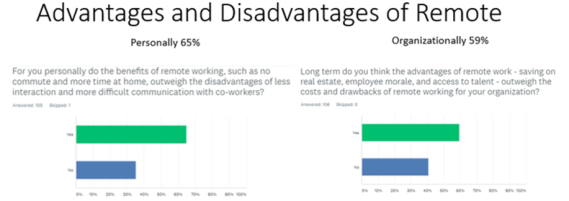Last week on this blog I posted a video of a panel discussion on remote working. As a part of the panel, I conducted a survey of attendees and LinkedIn followers that showed favorable experience with remote work during the pandemic.

Sixty-five percent of respondents to the survey felt that remote work’s advantages out-weighed the disadvantages for them personally; fifty-nine percent believed it was true for their organizations.
Arguments for in-person or hybrid work
Of course, the flip side of these statistics is that 35% and 41% of those surveyed felt that the advantages did not outweigh the advantages for themselves and the companies, respectively.
LinkedIn posted a discussion of The dark side of remote work. The issues raised in the LinkedIn discussion were very similar to issues raised in my survey by both supporters and opponents of remote working: communication and corporate culture suffer and management is more difficult. For that reason, many people brought up hybrid working – coming to the office two or three days a week.
Hybrid provides a reduction of commuting, which might still allow a company to recruit from a wider territory, while still maintaining contact with fellow employees.
When I realized the really dark side of remote work I saw that the remaining geographic limit in a hybrid work environment could be viewed as another advantage of that model.
The really DARK SIDE
Even though I used to teach a course in globalization and cross-cultural marketing, it was not until a conversation in my weekly zoom call with my friends Rich and Bob, that the true dark side from the remote worker’s point of view became clear to me. If my company is comfortable with my job being performed fully remotely, am I still the best person for it?
Is there perhaps someone more knowledgeable, willing to work longer hours, or cheaper in Austin, Salt Lake City, Belgrade, or Mumbai? Will remote work acquaint knowledge workers with the global competition experience?
Of course, the globalization of white-collar work has already been underway. The Internet has allowed companies to outsource IT, engineering, and other skilled work ever since the Internet and sharing tools made communication and collaboration possible across the oceans. Virtual companies already exist.
However, the pandemic has forced most organizations to try remote working and as indicated in my survey has shown positive results with “home office” staff. My son works for a fully virtual firm. They are setting up a consulting firm to help other firms work remotely, as they perceive an increased interest due to the pandemic.
Coronavirus has given remote work a broad jump-start, thereby likely accelerating the globalization of managerial and knowledge work.
How to respond to the globalization of knowledge?
One obvious strategy is to actively encourage the hybrid approach to remote work within your organization. As mentioned earlier, many workers and managers are more comfortable with at least some person-to-person communication. If employees are to come into the office two days a week they can be drawn from a larger radius, but probably not on the other coast or across the Pacific…
For those faced with increased competition from globalization, Thomas Friedman in The World is Flat, suggested that they make themselves “untouchable” by one of:
- Being the absolute best in the world at what they do,
- Mastering in-depth specialized (local?) knowledge,
- Be locally anchored, and/or
- Be adaptable and nimble to constantly stay ahead.
Friedman’s list seems challenging; I recommend an article written by my daughter for a leading social media marketing blog this week that includes updated tactics on how to save your job.
Business & Finance Articles on Business 2 Community
(45)
Report Post








